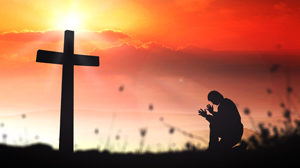Leviticus 25:1, 8-17
Matthew 14:1-12
Reflection:
The Scripture readings we hear in today’s Eucharist are a study in contrasts. The first reading from Leviticus deals with some of the practical issues involved in celebrating the Jubilee year. The gospel account is the story of King Herod Antipas (the son of the infamous Herod the Great) ordering John the Baptist to be beheaded.
The Jubilee was celebrated every fifty years in ancient Israel. The land was to lie fallow in order to let it rest. All debts were to be forgiven and special care was to be shown for those in need. In his hometown synagogue at the very beginning of his ministry Jesus himself quotes from Isaiah 61:1-2 where the Jubilee Year was also proclaimed (see Luke 4:17-19). The underlying idea of the command not to plant or sow during this Jubilee year was to be a reminder to the Israelites that the land was a gift from God and was not their personal possession. Striving to deal fairly with their neighbors, especially the poor, was an expression of their reverence for God.
The unsettling story of the execution of John the Baptist from Matthew’s Gospel is a startling contrast. Herod fits the picture of the excesses and cruelty of royal courts found in a lot of ancient literature. Even though Herod fears John as a great prophet and shuddered before the prophet’s confrontation with him about taking his brother’s wife as his own, the king succumbs to his ego and the promise he made to his wife’s daughter because he was dazzled by her dance. A terrible injustice—one that in Matthew’s Gospel anticipates the unjust death of Jesus.
A concern for the gift of the land and the need to care for those in need, on the one hand, and a picture of corruption and disregard for human life, on the other—that is the contrasting picture we hear today in our readings. Today is also the feast of St. Alphonsus Ligouri, the Founder of the Redemptorists and a great theologian who devoted his life to identifying the virtues necessary for a genuinely Christian life.
Everyday we seem to hear stories of wanton violence and disregard for human life. And recently, not unlike the message of Leviticus, Pope Francis published an encyclical, Laudato Si, in which he urges not only Christians but all people of good will to care for the earth, “our common home.” Some critics have responded that the Pope should stick to religion and not meddle in science or politics! But our Scriptures today remind us that condemning violence and caring for the earth as God’s gift entrusted to us are, in fact, deeply religious issues that reach far back into our biblical heritage. On this feast of St. Alphonsus—a contemporary, by the way, of the Passionist founder, Paul of the Cross—let us ask God for discerning hearts and the strength to choose the right way in our own lives.
Fr. Donald Senior, C.P. is President Emeritus and Professor of New Testament at Catholic Theological Union. He lives at the Passionist residence in the Hyde Park neighborhood of Chicago.

